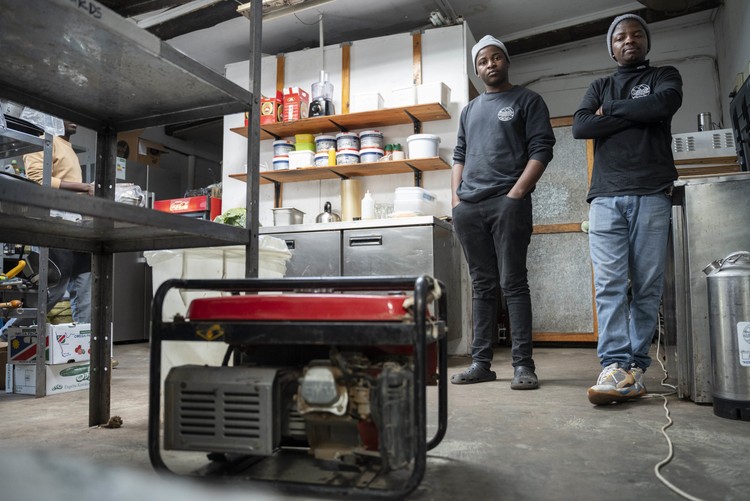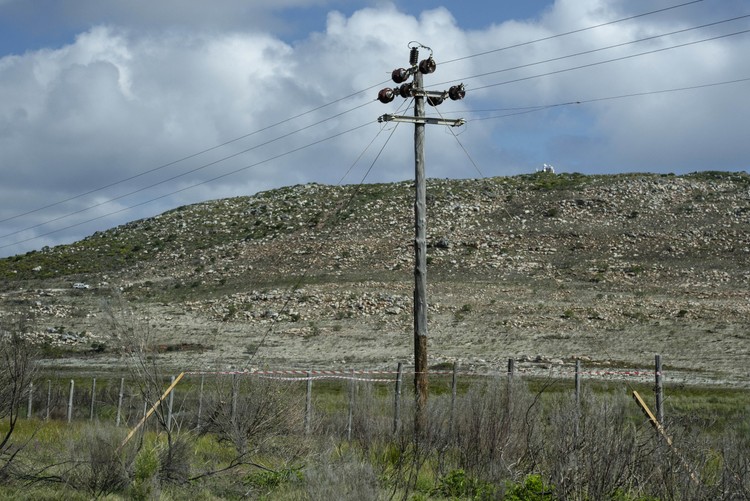Loadshedding is not over in Cape Town’s deep south
Unplanned power outages plague residents and small businesses near Cape Point
Workers Munashe Mudadi (left) and Arthur Mazivanhanga (right) with a generator that is used temporarily when there are electricity outages at the Cape Farmhouse Beer Garden run by the Lakeside Brewing Company in the Cape Peninsula. Photos: Ihsaan Haffejee.
- This winter’s heavy rain and strong wind seems to have exposed weaknesses in Cape Town’s electricity grid south of Scarborough and Simon’s Town.
- Residents say the power goes out whenever it rains, and stays off for at least six hours, but normally for much longer.
- Although the area is sparsely populated, there are numerous small businesses, and it includes the Cape Point Nature Reserve, one of Cape Town’s main tourist attractions.
Small businesses and residents near Cape Point have had at least ten electricity outages over the past two months, sometimes lasting for days at a time. The outages also affect the Cape Point Nature Reserve, which is one of Cape Town’s most popular tourist destinations.
Business owners near Redhill, along Plateau Road, and at Rocklands Farm bordering Simon’s Town said the power goes out for hours, and sometimes days, every time it rains, even during light rain. One power outage lasted for four days, from 8 to 11 August.
As a result, businesses, including those catering to tourists, have had to close for extended periods, and have lost revenue and customers.
Founder of Lakeside Brewing Company at Redhill, Morne Uys, said days-long power outages had resulted in the loss of several thousand rands worth of food as it was not possible to keep the fridges and freezers running.
Uys said his five employees also lost income due to lack of customers, and there was no communication from the City about how long outages would last.
“It’s just chaos,” he said.
Lakeside Brewing employees Munashe Mudadi and Arthur Mazivanhanga said the business, which also serves food, has a diesel generator but it is inefficient and can’t run for long. They said as a result, customers experience long waiting times for their food, and then often don’t tip well, which affects their earnings.
Founder of Burnett Wood Surfboards, Patrick Burnett, operates his workshop on the Good Hope Nursery farm off Plateau Road, and said he is struggling to complete orders from local and international customers.
Burnett said although his boards are hand crafted, he needs electricity for light, heat, and to operate power tools. He said whenever the power went out, it took the City six to eight hours, and often longer, to fix the fault. Running a generator for hours was not practical and the power outages are severely affecting his ability to keep the business afloat.
“The technical teams come out when they can, and there’s not much communication as to when they’re going to come out, what they’re doing, and when they’re going to fix it, or what the problem is,” Burnett said. “I’m not sure why that is, and it would be nice to actually have some transparency there.”
The nearby Redhill informal settlement of about 400 households is also affected. Redhill Community Centre programme director Yonela Duionta said school children used the centre to do homework and assignments, and adults used it to apply for jobs and use the internet. However, she said this was not possible when the power was out.
“The community suffers,” Duionta said.
Redhill Community Centre director Yonela Duionta says the centre is unable to serve the residents of Redhill informal settlement when there are extended power outages.
At Rocklands Farm adjacent to Simon’s Town, owner of The Coop coffee shop and farm stall, Bridget Albert, said they were struggling to operate through regular power outages, and echoed the experience of other small businesses owners, saying the power went out every time it rained.
She said at least loadshedding was scheduled, so she could plan around it, but the City’s power outages were unpredictable.
City mayco member for energy, Xanthea Limberg, said about half the “approximately ten” power outages over the last two months have been due to weather damage, with a smaller number due to theft and vandalism.
In a letter to Duncan Bates land surveyors given to GroundUp by ward councillor Simon Liell-Cock, Limberg gave additional causes for the outages, such as “bird strikes” and “baboon electrocutions”.
Limberg said there was “ongoing maintenance” of electricity infrastructure along Plateau Road. The City wants to run cables underground, and “network rearrangements” are being considered.
This includes ‘segmenting’ the supply so that if there is an issue at one point, it does not impact the whole stretch and that the fault could be isolated, stated Limberg.
She was not able to provide timelines for these solutions, but stated putting the overhead cables underground to reduce theft and weather-related incidents would be completed “over a number of financial years.” She said stolen copper cables are also being replaced with aluminium bundling as they are less valuable.
Leill-Cock said the affected area was “not a commercial zone” and businesses there “are not customer-intensive”.
“The City has to prioritise where it makes sense,” Liell-Cock said. “We can’t just throw money at people because they moan.”
Although Cape Point Nature Reserve, which is run by South African National Parks (SANParks) is one of the most visited tourist sites in the City, and has a restaurant at the lookout point and an electricity-reliant funicular for the long, steep climb to the point, SANParks did not respond to questions despite numerous attempts to obtain comment.
Calls to the funicular and restaurant went unanswered.
However, a supervisor at the reserve gate told GroundUp they had experienced numerous power cuts over the last few months, but she believed there was backup power available. She was not able to provide further details.
The City of Cape Town plans to run the overhead cables along the south peninsula underground to minimise cable theft and weather-related damage. However, this will take a number of years to complete.
Support independent journalism
Donate using Payfast

Don't miss out on the latest news
We respect your privacy, and promise we won't spam you.
Next: SIU takes aim at ballooning dodgy medical litigation that is costing the government billions
Previous: Cutting of 2,400 teacher posts questioned in Western Cape Parliament
© 2024 GroundUp. This article is licensed under a Creative Commons Attribution-NoDerivatives 4.0 International License.
You may republish this article, so long as you credit the authors and GroundUp, and do not change the text. Please include a link back to the original article.
We put an invisible pixel in the article so that we can count traffic to republishers. All analytics tools are solely on our servers. We do not give our logs to any third party. Logs are deleted after two weeks. We do not use any IP address identifying information except to count regional traffic. We are solely interested in counting hits, not tracking users. If you republish, please do not delete the invisible pixel.



